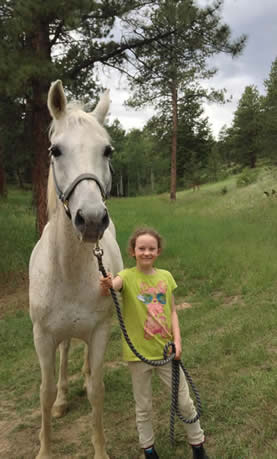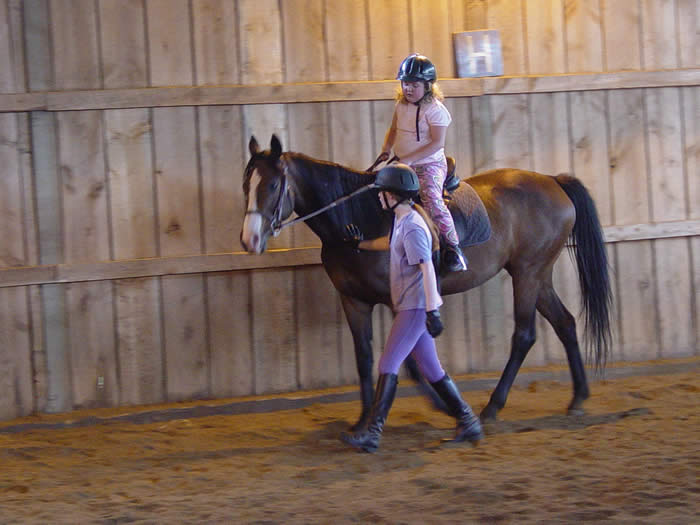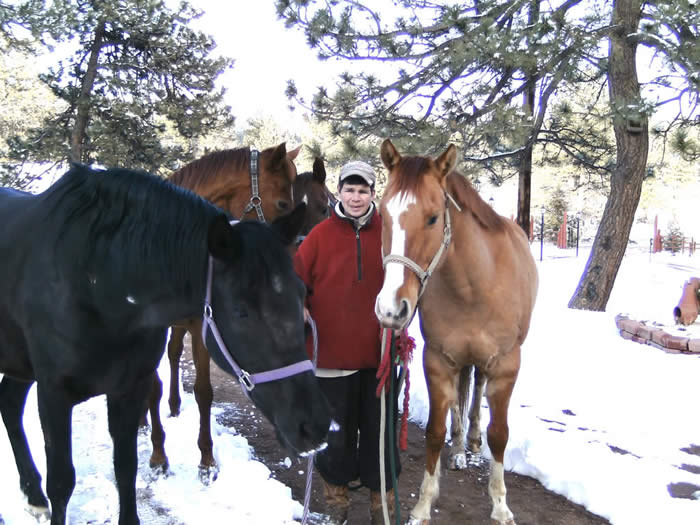|
||

Call or e-mail for more
information 12889 S. Parker Ave. Credit Cards Accepted Receive an Alert when a new offering is scheduled: |
 Connection with Nature Connection with Nature
Many people come to Centaur Rising seemingly estranged from their own bodies and the natural world around them. Being around horses requires that the student focus upon the animal, a force that is so big and strong that is could easily harm one. Students learn to subtly communicate with the horse, to receive information from the animal as well as to give him commands. Since most of good horseback riding is tactile and sensual, the student learns to connect with another living creature. Grooming a horse, feeling the rhythm of the horse’s movement are all therapeutic. Besides Centaur Rising is located in a place of undisturbed natural flora and fauna!
Humans have domesticated horses for thousands of years. The humane and sensitive handling of horses was first documented in Greek times. These approaches were refined and further recorded during the Renaissance. Cavalries of the 18th & 19th centuries used these approaches to create brave, obedient, responsive and athletic war horses. Dressage masters have maintained this legacy through the millennia. Dressage is now an Olympic sport. It also is the focus of competition at lower levels, including the type of introductory shows offered by Centaur Rising. The focus of what we teach is not, however, showing. The purpose of dressage (which means training in French) is to develop a horse that is obedient, responsive, balanced and a joy to ride. This is what we teach at Centaur Rising.
Developing self-assurance is an ongoing pursuit at Centaur Rising. Pre-schoolers obtain much confidence as they learn to control such a huge creature as a horse. We consistently try to build confidence while managing fear as the student progresses to learn new things. Many people are not naturally brave. It does not mean they cannot become excellent riders.
Dressage enables the horse to gracefully change gaits, shorten/lengthen and elevate his strides, to do intricate turns and maneuvers – not through the force of the rider but through subtle invisible cues. Centaur Rising takes this pursuit further by teaching students how to teach others. It takes great skill to translate nonverbal sensations and intended actions into words. The student-teacher must recognize emotions of the horse and rider, to ameliorate these before a situation gets out of control. A student-teacher must project his/her voice and to be ever alert to danger; all the while being patient, compassionate and resourceful. The skills one learns as a student-teacher easily translate into the skills required for effective human interaction.
In dressage we endeavor to preserve the individual personality and natural athleticism of the horse. Just as with people, it would be much easier to use force and punishment to inflict the human’s will upon the horse. Yet we do not want a horse that is beaten-down. We want a horse that is alive with his own awareness and love of the world. This requires two-way communication skills. It also requires that we be compassionate to the needs and perspective of the horse himself. We thus have few problems with lameness, soreness or undesirable behaviors. All of the problems are anticipated, observed and recognized long before they materialize. As students learn to be compassionate of the horse, they also learn to extend their empathy to fellow human beings. So often people buy horses with very little knowledge of what it takes to care for them, even in the most rudimentary way. They might learn from the local feed store or from their neighbors – about fencing, shelter, feed and water. Yet without understanding horse behavior, the new owner soon creates an animal that is willful and even dangerous. The dream of fun riding is soon gone. Our mountain community is littered with abandoned horse corrals. Where have these horses gone? Troublesome horses soon meet untimely ends. The previous owner may not realize what has eventually happened to their horse. Perhaps they don’t care. At Centaur Rising we teach people the commitment required to own a horse. It is not just the expense or the ongoing responsibility. It is also the obligation not to create a monster in their own backyard. In giving riding lessons to people we test their commitment. Does the student have the sincere interest to persevere? Are they willing to devote the time it takes to develop and maintain a partnership? Oftentimes the interest in horses is superficial and fleeting. We help protect horses from going to situations where the prognosis is not favorable. On the other hand, we work with people who keep their horse at home and trailer him to our indoor arena. We also help people purchase and learn to develop life-long partnerships with their horses. It is not easy to develop a community of horse people who support each other’s goals and do what they can to help each other become successful. Teenaged girls are especially pre-occupied with their own needs and emotions. At Centaur Rising, we use all of the above skills to help young people understand and work with each other.
|
Centaur Rising, a 501(c)(3) nonprofit organization, is located 20 minutes southwest of metro Denver near the Rocky Mountain foothill communities of Conifer, Bailey, Evergreen, Morrison, Golden and Pine, CO.
Thank you!
Unsubscribe | Privacy Policy | Home

 We use classical horsemanship because there is no end to the communication skills that can be developed to connect with a horse. The ultimate goal is that the student’s mind directs the horse – through the commands he makes to his own body parts, which in turn communicate with the corresponding parts of the animal’s body. Little by little it feels that the human spirit is willing cooperation from the horse. This is not just racing around. One could learn to stay on a racing horse through repetition alone.
We use classical horsemanship because there is no end to the communication skills that can be developed to connect with a horse. The ultimate goal is that the student’s mind directs the horse – through the commands he makes to his own body parts, which in turn communicate with the corresponding parts of the animal’s body. Little by little it feels that the human spirit is willing cooperation from the horse. This is not just racing around. One could learn to stay on a racing horse through repetition alone. 
